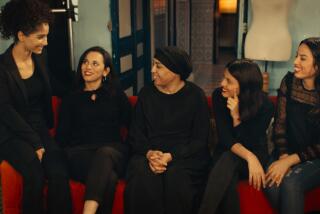Lovelorn Egyptians Rendezvous on the Nile
- Share via
CAIRO — On a perfect spring day, under blue skies and a gentle sun, 19-year-old Mahmoud Abdel-Aziz went on his first date. Holding hands and gently hugging, he and his girlfriend sailed up the Nile, free for a few hours from prying eyes and disapproving shouts.
They were among dozens of couples aboard the Sultan Ashraf, seeking escape from a city in constant conflict between Western influences and rising Islamic conservatism.
A Westerner would judge the Nile jaunt wholly innocent. But by Egyptian standards, it was daring enough to qualify as a lovers’ revolt of sorts.
In a city of 18 million, whose famous cosmopolitan texture is taking on a deepening Islamic hue, the young are bombarded daily by a mix of Islamic messages and Western excesses on satellite TV and the Internet. Often they are left frustrated and confused, wanting to date but wary of disapproval.
Only out here on the water, and at a few secluded spots on its banks and bridges, can they break fully free of an informal but rigid code of segregation based on class, wealth and gender.
Abdel-Aziz is a slender young man with hazel eyes and a goatee -- a romantic, a poet and a dreamer. His father, an occasional clothes factory worker, is struggling to put him through business college.
“I am a lover of love,” he said as he sat next to his sweetheart on a purple bench on the Sultan Ashraf’s upper deck. “But when I look at the mirror before I leave home every day, I am thinking: Life is not giving me what I deserve. But you know, I will keep at it until it does.”
As the boat sailed away from the skyline of office towers, past the slums and into lush farmland, the couple dropped their inhibitions. He gave her a carnation and then, in a gentle voice, read to her from a love poem that he had written and copied neatly into a red exercise book: “I confess, my princess, that I had never tasted happiness or joy on this Earth until I met you.”
The girl, too shy to give her name, listened attentively. She wore a mauve headscarf and ankle-length denim skirt, and blushed as he inched closer. They had met a month earlier at their college, and he had declared his love for her.
Arabic pop music blared from loudspeakers, and some of the women belly-danced, urging their dates to join in. Their writhing bodies in headscarves and tight pants -- the look known as “Islamic chic” -- seemed to crystallize the cultural clash unfolding aboard the Sultan Ashraf.
The battle for the soul of Arab youth is waged all over the Middle East, with many contrasts.
In cosmopolitan Beirut, the sexes mingle freely. In Saudi Arabia and the Gulf states, they can’t even meet.
Yet even the fiercest custodians of morality haven’t reckoned with cellphones. Nowadays, a boy and girl can stand in a busy Saudi mall, behaving like complete strangers while text-messaging intimacies to each other.
The problems that surround dating in Cairo were memorably portrayed in “A Cultural Film,” a 2000 comedy about three sex-starved young men with a pornographic video and nowhere to watch it. The film -- its title an Egyptian euphemism for porn -- caused a stir with its radical departure from traditional Arab romance movies, which were usually morality tales about the virtues of chastity and marriage.
“Rebelling against customs is key to progress,” said Mona Helmi, a poet and columnist in her 40s whose mother, Nawal al-Saadawi, is one of Egypt’s leading women’s rights campaigners. “We cannot live by customs created by people who lived and died hundreds of years ago.”
But this battle carries more potential danger in Cairo, where economic disparities are deep, riots break out over perceived injustices, and Islamic tradition is for many the only source of comfort and certainty.
Lack of social mobility leaves youngsters from poor families struggling to create a youth culture they can afford.
What they want most is the freedom to date. Yet dating is frowned upon for fear that it will lead to premarital sex -- or at least the temptation to have it. For an unmarried woman, being seen in male company could wreck her marriage prospects.
The frustrations strike the religious and nonreligious alike.
Jaafar Ali, 23, an architecture student, is deeply pious. He was briefly detained in 2002 on suspicion of belonging to an extremist group. Yet he and four of his brothers -- ages 17 to 24 and equally religious -- see nothing wrong with talking to women in Internet chat rooms.
The question, Ali said, is, “Where can I find them, see them and love them?”
Even when a couple do finally get together, they’ll hasten to inform anyone they meet that they are engaged, lest they be suspected of something unseemly.
“I came to this area on three dates with my wife when we were engaged,” taxi driver Haitham Salah, 27, said as he drove on Cairo’s Nile-side corniche -- another place where couples can turn from the crowded streets, lean over the water and gain some privacy. But the whole time, he worried “that those who saw us may have thought that we were not engaged, that she was just a girl I picked up.”
Aboard the Sultan Ashraf, even as he was savoring his first date, Abdel-Aziz -- the “lover of love” -- was already declaring that he intended to marry the girlfriend he had met just a month earlier.
Yet it soon transpired that things were not so simple. He also felt obligated, he said, to forgo marriage until he had repaid his parents the money they were spending to put him through college.
“She is the one,” he said of his date. Then he added: “But circumstances can push us apart.”
More to Read
Sign up for The Wild
We’ll help you find the best places to hike, bike and run, as well as the perfect silent spots for meditation and yoga.
You may occasionally receive promotional content from the Los Angeles Times.






